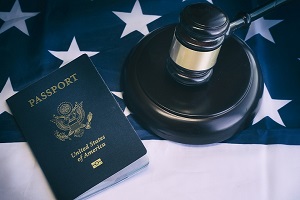How To File A Consular Waiver For My Family Petition?
”El Show Sin Fronteras”
Spanish Video Above Translated In English Below
What Is A Waiver For Illegal Entry?
There are many types of waivers in the immigration world, when someone is applying for Asylum, a Fiancé Visa or K-1 Visa, an adjustment of Status, Consular Processing, etc.
Any type of case comes with many types of waivers, and today you will find out how a person who has entered the United States and is inside the country, perhaps entered without a Visa or entered with a Visa and overstayed his or her permit, can arrange for a family petition.
The person who is present without permission will need a waiver to settle in the United States, and the waiver is an immigration process to exculpate the punishment that the person is carrying for having violated in one way or another his or her immigration permission.
The punishment related to a relative case happens when someone has more than 6 months without permission in the United States, that person is punished for 3 years.
If you have been present in the country without permission for more than 1 year, the punishment is for 10 years, and the pardon for this type of punishment begins when we are doing the Consular Process, and is based on the petitioner’s suffering.
We focus on the applicant, their inputs, and their story, but then in the next step we are telling the story of this couple or that mom because we can base that forgiveness that is needed for a family case only on a husband, a father or a mother, we can’t base that kind of forgiveness on a child.
Who Needs A Waiver?
Only people who carry the punishment, let’s say a person who entered and stayed 3 months and left the country, that person does not carry a punishment because he has no more than 6 months in his case.
If a person entered the United States as a minor and received his or her first DACA before the age of 18, in the middle of that age that person had no unpermitted presence after obtaining the DACA program and is not 18 years old, that person does not need a waiver either.

Every case is different, and everyone who is doing the relative petition process should consult with a legal professional because many people think they are going to need a pardon but don’t need one, or don’t think they are going to need one and do the Consular Process and come to their appointment at the Consulate and need a pardon and can’t return to the country.
This is a very important point in processing a family petition case through the Consulate, and you need to know exactly what you need and obtain approval before your departure.
When To File For A Waiver?
When we are doing Consular Processing for a person who is already inside the United States, for example, let’s say the case is a spouse of a permanent resident and she entered many years ago without a Visa.
These people got married, and he will want to ask for the first step, which is the family petition.
For this you must fill out the I-130 form, with this petition you are proving that you have permanent residency, that you are a bona fide married couple, then you provide evidence such as proof of shared children, bank accounts, or a rental contract, to prove that relationship after the I-130 is approved, we move forward with the second step which is the waiver.
When we are proving that the permanent resident cannot live in the United States without his wife and also cannot go to his country which is Mexico because maybe he has a job here, or those parents share children in common.
With the step of forgiveness which is the second step to be done, we must investigate a little about the life of this person, we are talking about his income, his illnesses, his other relatives, etc.
Basically, it is about the reasons why the person wants to stay here in the United States with his or her spouse.
You apply for that waiver after the I-130 relationship but before processing by the Consulate which is the National Visa Center which was going to ask for a lot of documents and more and all that but it is important to do the waiver before all that.
Lawyers & Forgiveness
If a person already has a family petition that he/she is handling with an immigration attorney, would it be good at that time to also request another attorney for the Pardon or can the same attorney handle everything?
If the person has been working with another attorney and does not have confidence with that attorney’s office, perhaps it is because they are a notary, perhaps they do not return calls or are not up to date with that case.
There are a lot of complaints from people working with other attorneys and sometimes the client is right, sometimes they are frustrated with the process and there is nothing we can do to change their situation, but sometimes they are reasonable complaints and it is possible to change offices or attorneys during the process if you do not trust the person you are working with.
Likewise, the entire process is an immigration process, so an attorney with no experience in any immigration case should be able to handle the entire consular process including the waiver.
Can Children Petition Their Parents?
Let us remember that forgiveness is focused on the petitioner who has to be a husband or wife, a father or a mother.

Consult With Our Legal Guardians About How To Fix Your Family In The United States
If you entered without a Visa even though your child after his or her 21st birthday may petition you, you will need a waiver for presence without permission and you cannot base the waiver case on your child, but if you are married to a permanent resident, a U.S. citizen or your mother or father is a U.S. resident or citizen, your child may petition you and you may be able to base your waiver on your parent’s case.
One thing to note is the importance of having the strategy planned as soon as the case starts because not everyone has to process through the Consulate and it is not good to process if it would be possible to settle within the United States without having to leave.
In general, there are 4 ways to deal with a family case within the United States without having to leave or process through the Consulate.
The first way is when a person is an immediate relative of a U.S. citizen, say a spouse or a minor child, that person who is the beneficiary entered with a Visa, even though he or she may have overstayed the time allowed even though his or her entry was legal with a Visa, that person will probably be able to adjust status without having to go through the Consulate and sometimes a waiver is not needed.
The second exception is when there is an immediate family member with a person who has served in the Armed Forces, and with those people even though they entered without a Visa, we can make a case called Parole In Place to be able to settle legally within the United States.
The third option is for people who were ordered before April 30, 2001, that is the program. 245-I and is a type of amnesty that began in the 1990s to provide adjustment of status to family members of resident aliens even if those individuals entered the United States without a visa.
The fourth option is when a person is in a relationship with a family member who is violent or there is cruelty in the relationship of a parent, child, or spouse, that is the VAWA (Violence Against Women Act) program and applicants in that program can adjust their immigration status without having to leave the country.
The rest of the people who are arranging for a family member who entered without a Visa and has no one serving in the Armed Forces, no one has asked them before 2001, have not suffered cruelty in their relationship, they are probably going to have to reserve for Consular Processing.
Consular Process For DACA Or TPS Beneficiaries
Do people who have DACA or TPS programs count towards helping them get fixed in the country? o How do you handle these cases?
When someone has the TPS or DACA program, those programs have an option called Advance Parole and in that program, we can go through the immigration process.
In DACA, for example, when a Dreamer has a reason and needs to leave the country for a humanitarian reason, for example, to visit a family member who is sick, or for an educational reason, or for a job, we can ask for that permission to leave and return to the United States, that is called Advance Parole.
This Advance Parole option exists for those who have the TPS program, and those people after leaving, will have a document with a stamp permitting them to enter the United States, and with that legal entry, they can adjust their status without needing a pardon.
What Is The Permanent Bar?
It is somewhat complicated, but it is very important to clarify this before starting the immigration process.
There is a punishment called the Permanent Bar, which is a permanent punishment that applies to people who received deportation by a judge or by an immigration officer and then tried to return without permission.
If they were caught after deportation they are going to have this type of punishment, or if they had been without permission for more than 1 year, they left and returned illegally, but everything has to be after 97.
Let’s say a person entered the U.S. in ’99 without being caught at that time, stayed 1 year and left to visit family, then returned in 2001.
This person, unfortunately, carries that kind of permanent punishment, and that punishment for normal family cases (not violence cases, not VAWA cases) says that these people have to leave the United States and wait 10 years before they can ask for a pardon to return.
Some people did not know they were carrying this punishment, went to their appointments at the Consulate, and found out that they were carrying the Permanent Bar and could not return for 10 years.
It is possible to do the I-130 for people who carry this punishment and immigration will approve the waiver, they will approve the paperwork from the National Visa Center without knowing that this person carries this type of punishment, but when they arrive at the Consulate appointment, they will check all their entries and their records for their fingerprints, no matter if they used a false name or said they were Mexican but they were Honduran.
Everything is going to come out at the checkup before the appointment, and that’s why it’s very important to know when you came in when you left when you were grabbed, and to say everything at your first consultation with us so that we can give you correct advice because we don’t like it when we have to stop a process and leave it in the middle when we find out that a person went out, came back and didn’t tell us.

Learn About The Options Lincoln-Goldfinch Law – Abogados de Inmigración Offers For You And Your Family In The United States
It is important to remember all of that and if you cannot remember any entries or exits, you can request a copy of your file with immigration which is the FOIA.
Necessary Documents For A Waiver
Do I need more documents and evidence in addition to what my attorney has already requested for my family petition? Do I need anything else to process the waiver?
The waiver is different from the I-130 form because this one is focused on the legal status of the petitioner if he/she is a US citizen or permanent resident and the relationship between those people, but the waiver is based on the petitioner’s suffering, and that is why it is necessary to gather more things from the petitioner’s life such as his/her income, medical treatment, psychological document.
For the final case, everything is for permanent residency.
In case you have additional questions about family petitions, whether you qualify for a waiver, or about your specific case, you can contact us at (855) 502-0555. After a short 10 minute evaluation of your case over the phone we will let you know what options you have. You can also follow us on our social networks so as not to miss our weekly transmissions via Facebook, YouTube & Twitch.
Frequently Asked Questions About Family Petitions
Contact A U.S. Immigration Attorney Today!
Categories
How To Find Us
What Our Clients Say
“This Lawfirm is great, very professional and helpful. I love that they are always in communication and always available for when you have questions . 100% recommended by me and my family. Thank you Lincoln-Goldfinch Law – Abogados de Inmigración”





